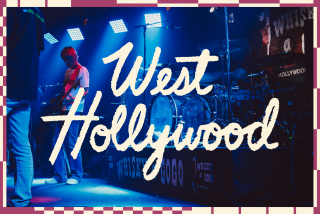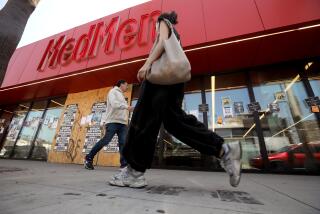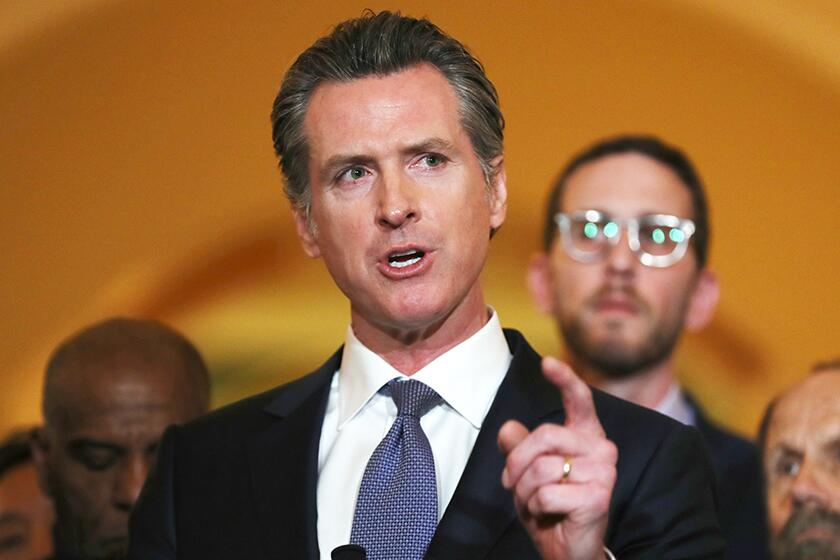Eddie’s--Oasis for Talk and a Shave : Neighborhoods: For generations near USC, hair cuts, kindness and a sense of community have been dispensed in this traditional gathering spot for men.
- Share via
On a lazy Wednesday afternoon, late in the day but long before quitting time, the only sounds breaking the stillness at Eddie’s Barber Shop are the whir of a fan and the click of a pair of scissors easing through an old man’s hair.
Then a customer stirs.
Looking out the window, toward a building across the street, he asks a question that for the next five minutes will immerse the shop in deep, thought-provoking debate.
Is it better to jump off or fall off a 35-foot-tall building?
“There’s a height difference between jumping and dropping off,” answered Pat, one of the shop’s three barbers. “If you’re hanging off you cut about six feet.”
“It can’t be that much difference,” said the skeptical customer. “I think you can get just as hurt jumping off or dropping off.”
Nope, said shop owner Eddie. “If you jump off a building it’s better.”
No matter, said the customer who had started the hullabaloo. “That building over there’s taller than 35 feet anyway.” End of discussion.
Or is it? “Hey”, the customer says, again peering out the window, “how tall is that building?”
Welcome to Eddie’s, a four-chair barber shop no bigger than a living room, that’s been tucked away in the shadow of the University of Southern California campus since 1945.
To those traveling by, it’s nothing more than a tiny yellow building on Jefferson Boulevard, in the middle of Southwest Los Angeles--a place you’d miss if you didn’t look twice.
But to those in the surrounding community, Eddie’s is an oasis--a refuge for neighborhood residents trying to forget their troubles, and a haven for black students at the neighboring college who sometimes just need a place to call their own.
At school “I feel the hostility,” said Gregory Smith, a 28-year-old communications student at USC, which lies a block and a half east of the shop. But “when I walk through the door, it’s gone. I feel like I’m home again. Y’know?”
The barber shop has traditionally been a meeting place in the African-American community, where the paths of the middle class and working poor cross at the barber chair.
For that community, Eddie’s has been a common ground for decades, where addicts and attorneys, students and drop-outs, janitors and judges, get shaves and hair cuts side by side.
And for a few hours, their differences don’t matter.
“I used to feel funny when I came here because (some customers) were from the neighborhood,” said Randy Tanner, 23, a former USC football player whose only contact with the community was through Eddie’s. But “now I know most of them . . . I don’t have to play the role here. I feel more comfortable here than I did walking around campus.”
Eddie Haywood, 57, took over the business in 1973, more than two decades after he began working there in 1951, fresh out of American Pacific Barber’s College.
“It was a beautiful neighborhood,” remembered Eddie, who has had a gun pulled on him at the shop five times in the last two years. “You didn’t hear anything about drugs at all.”
Of course, that was a long time ago, when the shop was still owned by the Gordon brothers, when the “fade” cut was the “high English,” and there were were no such things as “hair stylists”--just barbers.
Since then, Haywood and fellow barbers Pat Patton, 60, and Cras (Mac) McNeal, 55, have served hundreds of customers. All the while watching houses come down, businesses move out, and crack move in, right outside the barber shop window.
In that way it’s no different than many other neighborhoods throughout Los Angeles, where residents who’ve spent their lives battling the forces of poverty and unemployment now have to combat the effects of drugs.
“It’s a lot of petty stuff going on . . . for some cocaine,” said community activist Levi Kingston, who has worked in the area around Eddie’s for 12 years.
Three or four years ago people were willing to come out of their homes to help make the community better, he said. But not now.
“There’s a lot of fear and a lot of it is understandable,” said Kingston, who has seen crime escalate during the last two or three years.
Police had no statistics on crime in the area, but Los Angeles Police Officer Dominic Licavoli, who monitors the area, said last year was particularly bad. Crime has decreased, however, during the past several months, he said.
Despite the changes outside, Eddie’s has remained the same--one of the few stabilizing forces in the neighborhood.
At Eddie’s you walk in the door and see the worn chair where Eddie clipped the hair of boys who fought in the Korean War and the Vietnam War.
There’s a 1960s poster for Duke’s Afro Sheen tacked to a corner wall, and a calendar that’s been hanging on a back door for four years: not because 1985 was such a good year, but because the 1989 version didn’t come with a picture of “Debbie,” dressed seductively in a black bikini.
Elderly men enter the shop with a hearty hello, then line the shop’s chairs, glad to have somewhere to pass the time.
And young children, with worn bicycle tires and empty stomachs, line up to get air from a shop pump, and a glazed doughnut from a box atop the shoe shine stand. A “please” and “thank you” are all that is required.
“We make them say ‘thank you,’ ” said Eddie, who put his five children through college on earnings from the shop. “We want to teach them. You’d be surprised how many of them don’t know how to say that.”
Eddie has a special fondness for the kids, many of whose parents he watched grow from wide-eyed children into listless dope addicts.
“Their mothers and fathers don’t give them nothing,” he said in disgust. “They don’t half feed (the children) because they take the money and buy drugs.
“Sometimes I get tired of the grown-ups,” he said. “But I never get tired of the kids.”
Children are not the only ones who learn life’s lessons at Eddie’s. Many a grown man has also learned a thing or two there, about himself and those who came before him.
“I go there for the opportunity to listen to the talk of older, wiser black men,” said Jeffrey Clayton, director of USC’s Upward Bound program, and an off-and-on customer at Eddie’s for the past 15 years.
Comparing the barbers to griots, respected elders in Africa who keep an oral history of their communities, Clayton added: “I listen to the wisdom, what they’ve been through in their lives.”
They all have stories to tell.
There’s Mr. Johnson, 88, who doesn’t set foot inside Eddie’s unless he has on his dress shoes and a tie. “I’m dressed up everyday,” said the retired slaughterhouse worker, sitting in Eddie’s one Saturday afternoon. “I told my kids, ‘Don’t bury me in no overalls.’ I wore enough of them.”
There’s Mr. Spellman, the shop’s resident religious scholar who has read the Bible from Genesis to Revelations 15 times.
And there’s Carter.
“He’s our man Friday,” said Pat, who started at the shop in 1961. “He does the chores for us, runs errands.”
Carter--even the barbers don’t know his first name--is an old-timer from the neighborhood who “fell down in life,” Mac said. But it wasn’t crack cocaine that caused his decline. It was liquor.
“He got on that wine, drinking all night and sleeping all day,” Mac said.
Then he started doing chores around the shop for a dollar.
“I needed help, I really did,” Carter admitted. “They came one day and said ‘you’d better leave that bottle alone.’ ”
Pat let him live rent-free in a house he owns, and now, “we got him drinking apple juice and eating everyday,” Mac said.
But there’s more to Eddie’s than whiskers and wisdom. There’s also laughter, good times and plenty of stimulating conversation--even if some of it does fall into the “tall tales” category.
“I’ve seen guys in the barbershop, and they’re telling lies when I walk in the door, and still lying when I walk out,” said longtime customer Frank Whitehead, who sometimes drives all the way from Orange County to get his hair cut there.
Eddie knows he could never open a shop anywhere else.
“I’ve been here too long,” said Eddie, who watched Rocky Marciano whip Jersey Joe Walcott on a black-and-white TV right there in the shop. “When I leave here, I’ll retire.”
That’s a day many shop regulars say they’d rather not think about.
“Yeah,” said Carter, somewhat wistfully. “I guess I’d miss ‘em.”
More to Read
Sign up for Essential California
The most important California stories and recommendations in your inbox every morning.
You may occasionally receive promotional content from the Los Angeles Times.










